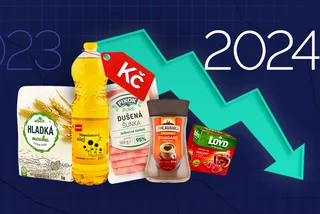Shoppers preparing to stock up on Easter ingredients will find some relief at the grocery store compared to last year. Several staple foods for traditional dishes are cheaper, providing an opportunity to save on festivities.
Some commentators call this year's Easter basket the "second-cheapest" in Czech modern history, relative to net wages. However, not all items have seen a price decrease, with some popular Easter foods also becoming more expensive.
What will actually become cheaper?
Several key ingredients in Easter meals – eggs, butter, flour, sugar and milk – are significantly cheaper than the year-earlier period.
While last year's Easter basket containing all essential items cost CZK 211 last year, this price has now dropped to CZK 184. This year, a person in the Czech Republic can buy 199 Easter baskets for the net average Czech monthly salary, which is the second-highest number in history.
In 2018, Czechs could only buy 161 Easter baskets with a net annual Czech salary at the time, despite goods being much cheaper.
PRICE CHANGES FROM LAST YEAR
- Butter (1kg) - From CZK 211 in March 2023 to CZK 203 in March 2024
- Semi-skimmed milk (1 liter) - CZK 28 to CZK 25
- Flour (1kg) - From CZK 24 to CZK 20
- Crystal sugar (1kg) - From CZK 33 to CZK 28
- Eggs (pack of 10) - CZK 60 to CZK 56
- Roast pork - CZK 163 to CZK 175
Source: Czech Statistical Office
Why have some foods dropped in price?
The fall in price is partly attributable to a high base from 2023 and the reduced value-added tax (VAT) on food items in supermarkets, which came into effect this January. A bird flu outbreak also put pressure on egg prices last year, explaining the substantial – 25 percent – annual fall in egg prices this Easter.
The respite from escalating food costs is also partly due to consumers cutting back on purchases amid high inflation last year, which pressured retailers to halt further price increases.
Despite reviving household demand, economists do not anticipate any further food-price hikes in the coming weeks. "Of course, the development of the weather and crops will be a factor, but we can assume that we will no longer experience wild increases and then decreases in prices. The situation is normalizing," Česká spořitelna economist Michal Skořepa told Czech media outlet ČT24.
Some items will get more expensive
Not everything in your Easter shopping basket will be cheaper, though. Prices of pork have risen slightly compared to March 2023, and chocolate – perhaps the most popular Easter food – has become far more expensive due to global supply issues.
"Cocoa beans, which make chocolate, are now the most expensive in the history of the Czech Republic. This will cause a significant increase in the price of chocolate and chocolate-based confectionery in domestic stores," wrote chief economist of Trinity Bank Lukáš Kovanda on financial-news site Kurzy.cz towards the end of last year.
Strategic Business Development Lead | Advanced Com

Sales Lead | High-Performance Computing & AI

Still cheaper in Poland
That many supermarket items in neighboring Poland are cheaper is well-documented, and those living near the Czech-Polish border may well consider visiting Poland briefly to stock up on their Easter goods. ČT24 found, for example, that a pack of eggs was cheaper in Czechia's neighbors, despite the sharp fall in egg prices at home.
However, this may be among the last chances for people living near the Czech-Polish border to find cheaper produce in Poland. From April 1, VAT on food items in Poland will return after an absences of around two years, and prices should broadly increase.












 Reading time: 3 minutes
Reading time: 3 minutes 




 Swedish
Swedish
 Hungarian
Hungarian
 Spanish
Spanish





















